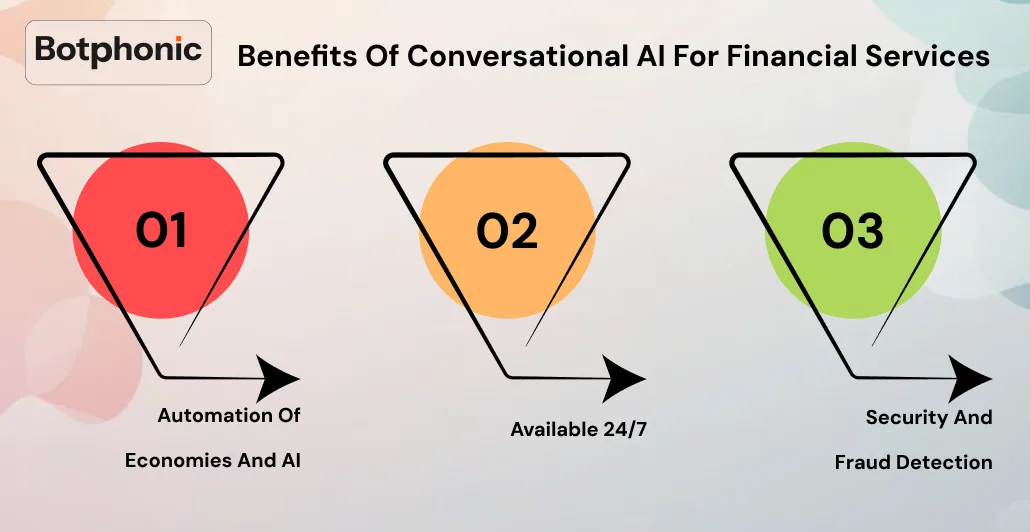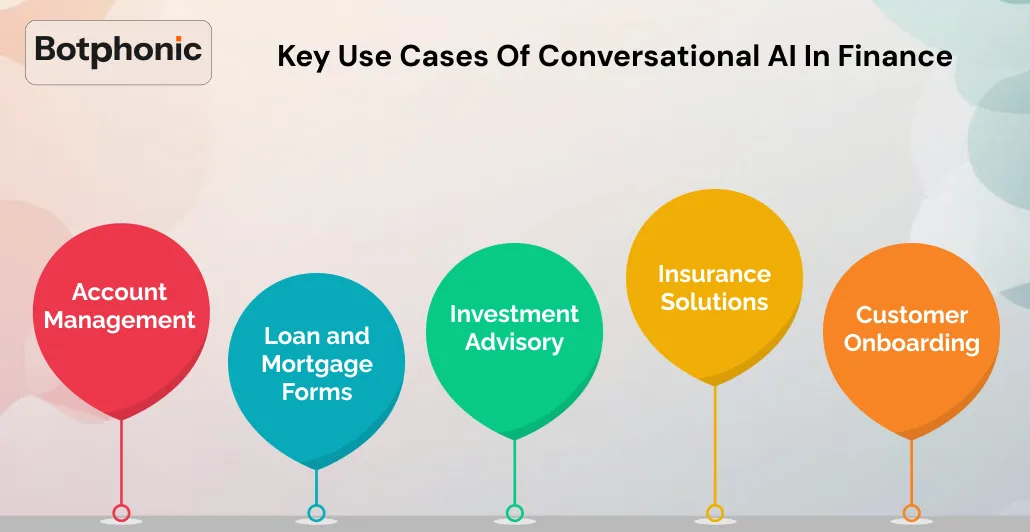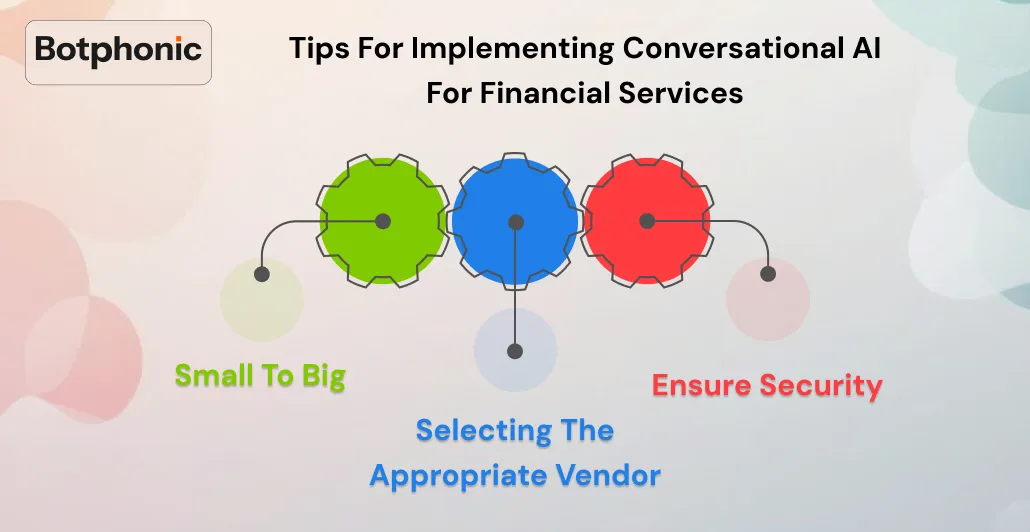
Summarize Content With:
Summary
We will discuss the transformational aspects of conversational AI in financial services in terms of customer experience, enhanced operations, and revenue maximisation in this blog. We will talk about its applications, advantages, market trends, and influence on the future of finance.
Introduction
Just think about how wonderful it would be to have the ability to ask for instant answers about your bank questions and solve problems that you have without having to stand in a very long queue. You even have personalised financial advice at any time of the day. Sounds incredible, doesn’t it? This is precisely the same thing that is occurring nowadays with smart conversational AI in financial services. It is transforming the way banks, insurance firms, and other financial bodies relate to their clients.
This is an article in which we are going to look at how conversational AI in financial services is altering the game. Regardless of whether you are in the business of finance, are a business owner, or are just a reader wondering how powerful this technology can be, this blog should be able to shed some light on the reason this technology is so powerful and its future.
Key Takeaways
- Financial Services Financial services companies are leading the transformation of customer support to be much more personalised and faster with conversational AI.
- Due to AI, financial institutions have managed to reduce expenses and increase their security and customer satisfaction rates.
- The most efficient conversational AI products are already provided with AI voice-by-text, multilingual capabilities, and automation options.
- AI technology tools are becoming increasingly common, and AI in 2025 will likely be more developed and incorporated in the field of finance.
What is Conversational AI in Financial Services?
The main notion of this should be known before exploring it further. Conversational AI in financial services means the use of advanced artificial intelligence technologies, e.g., chatbots, voice bots, and virtual assistants, to interact with customers through natural, human-like conversation.
Nonetheless, unlike the old-fashioned chatbots that work with predetermined responses, the improved conversational AI employ Natural Language Processing (NLP) and machine learning. They can know the context, feeling, and intention. Whether it is a customer requesting account balances, making payments, or seeking investment advice, conversational AI in the finance sector can perform these tasks effortlessly.
Why does this Matter?
The finance business thrives on the trust and efficiency of customers. Patrons are used to getting fast and precise as well as customised services, and AI and customer service technology innovations are closing that divide.
Benefits of Conversational AI for Financial Services

With the customer service AI, banks and financial institutions can answer customer questions in real time. An example of this is when a customer cannot remember their credit card PIN or inquires about loan eligibility, an AI-powered bot would be able to give answers quickly.
1. Automation of Economies and AI
Using AI in automation helps in lowering the operating cost immensely. A conventional call center will have to have a very large group to manage thousands of calls per day. With chatbot companies, most of this work is automated.
It was estimated that by 2025, companies would save more than $8 billion annually when chatbots and AI are used to provide services.
2. Available 24/7
Conversational AI in the financial field is available at all times, unlike human agents. Customers will be able to access their accounts, get advice, or initiate a complaint at any point, a factor that will enhance customer satisfaction.
3. Security and Fraud Detection
Society also has the advantage of AI solutions in financial services, as suspicious activities can be detected in real-time and alert the customer and the bank to possible fraudulent activity.
Key Use Cases of Conversational AI in Finance

1. Account Management
In conversational AI in finance, a customer only needs to check the account balance, see their transaction history, or make payments.
2. Loan and Mortgage Forms
The AI bots make the process of applying for a loan easier by taking the customer through the process. They are also able to pre-qualify their customers for loans by analysing the data they have.
3. Investment Advisory
Virtual assistants using AI can offer personalised advice on investments so that customers can make the most suitable decisions according to their risk tolerance and financial goals.
4. Insurance Solutions
Conversational AI has found its application in many AI insurance solutions today and performs tasks such as policy details, claim processing, and policy renewal reminders.
5. Customer Onboarding
Bots powered by AI can handle KYC (Know Your Customer) and simplify the process of onboarding new customers.
How Conversational AI Vendors Are Driving Change
The emergence of AI conversational vendors has enabled the adoption of AI-driven products by financial firms. These supply ready solutions that can be combined with the existing systems without the involvement of intense development.
| Vendor Capability | Impact |
| AI voice from text | Provides natural, human-like conversations |
| Multilingual support | Engages customers across different languages |
| Integration with CRMs and ERPs | Automates workflows and customer data management |
| Advanced analytics | Tracks customer behaviour and improves service strategies |
Future Trends of Conversational AI in Financial Services
AI of 2025
In the finance industry, we will see further integration of AI Call Assistant in 2025. Virtual assistants will even get smarter; they will be able not only to perform simple tasks but also such complicated ones as portfolio management and fraud investigation.
AI for Services Will Be Hyper-Personalised
The solutions in the financial services will no longer be one-size-fits-all. The use of AI will allow knowledge about the consumer to be interpreted, providing hyper-personalisation of products and recommendations.
Best Conversational AI Tools Will Be More Accessible
Vendors will also provide the SaaS models that the smaller banks and startups can afford to integrate the best conversational AI tools.
Tips for Implementing Conversational AI for Financial Services

1. Small to Big
You do not need to automate everything at once, but concentrate on one aspect, such as customer service AI. Relate to other services.
2. Selecting the Appropriate Vendor
Conversational AI vendors are not equal. Seek out one who has worked in the area of AI solutions in financial services and insurance.
3. Ensure Security
Finance is a sensitive field; therefore, when selecting a platform, it is crucial to choose those that have strict security measures.
If you are interested in trying an AI solution to improve customer experiences, here is a link where you can explore more opportunities. Try the Botphonic AI out yourself now
Conversational AI for Finance: Real-World Examples
Conversational AI in financial services is no longer a future-oriented vision; it has a tangible effect already. Most banks, insurance companies, fintech firms, and wealth management institutions are deploying these solutions to enhance customer service and operational efficiency.
1. Financial Institutions that use Conversational AI
Customer service AI can work with millions of queries made by large bank customers every month and helps to manage this mass effectively. As an example, some of the multinational banks already apply chatbots and AI voice text solutions to provide answers to questions of balance, reset passwords, and even send money via safe virtual assistants. This has lowered customer delays and increased customer satisfaction significantly.
2. Insurance Companies that are Cashiers of AI Insurance Solutions
Insurance companies are also integrating conversational AI vendors to make the insurance renewal and claim submission processes less complex. The customers can now file claims by chatting with a virtual assistant, and they will get real-time updates on their requests. Such AI tools in the insurance industry have resulted in faster claim processing and a better customer experience.
3. Fintech Startups and AI to Provide Services
Fintech firms take advantage of automation with AI to accelerate onboarding and provide finance-related personalised advice. Customers go through prompt verification processes, instead of filling in long forms, with the help of chatbots. The various features of the virtual assistants are to enable users to monitor expenditures, develop savings orientations, and receive investment advice.
4. Wealth Management Firms
Wealth management companies implement the best conversational AI solutions to deliver personal financial advice and real-time updates of their portfolios around the clock. When clients ask a simple question, such as “How is my portfolio performing?” they will get on-the-spot answers to this by utilising the powers of data.
Conclusion
Conversational AI in the finance industry is the future of finance. Through automation of customer interactions, cost reduction and provision of personal experiences, the financial institutions can differentiate themselves and be competitive.
When it comes to the world of finance, if you have not considered using conversational AI in the finance world, now is a good time to learn more about it. The technology is mature and available and can add massive value.

